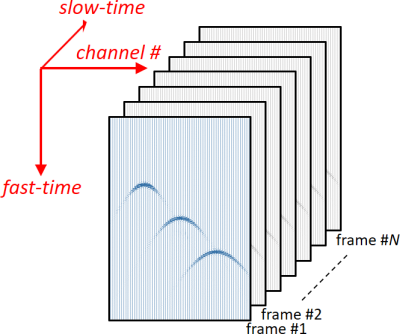WFILT Wall (clutter) filter
WFILT high-pass (wall) filters the RF or I/Q signals.
Contents
Syntax
fSIG = WFILT(SIG,METHOD,n) high-pass (wall) filters the RF or I/Q signals stored in the 3-D array SIG for Doppler imaging.
The first dimension of SIG (i.e. each column) corresponds to a single RF or I/Q signal over (fast-) time, with the first column corresponding to the first transducer element. The third dimension corresponds to the slow-time axis.

Three methods are available .
METHOD can be one of the following (case insensitive):
- 'poly'
Least-squares ( degree) polynomial regression - Orthogonal Legendre polynomials are used. The fitting polynomial is removed from the original I/Q or RF data to keep the high-frequency components. n, with
degree) polynomial regression - Orthogonal Legendre polynomials are used. The fitting polynomial is removed from the original I/Q or RF data to keep the high-frequency components. n, with  , represents the degree of the polynomials. The (slow-time) mean values are removed if n = 0 (the polynomials are reduced to constants).
, represents the degree of the polynomials. The (slow-time) mean values are removed if n = 0 (the polynomials are reduced to constants).
- 'dct'
Truncated discrete cosine transform - Discrete cosine transforms (DCT) and inverse DCT are performed along the slow-time dimension. The signals are filtered by withdrawing the first n (>=1) components, i.e. those corresponding to the n lowest frequencies (with respect to slow-time).
- 'svd'
Truncated singular value decomposition - An SVD is carried out after a column arrangement of the slow-time dimension. The signals are filtered by withdrawing the top n singular vectors, i.e. those corresponding to the n greatest singular values.
See also
Reference
The polynomial regression filter was used in the following paper. The polynomial degree was determined automatically by minimizing the Akaike Information Criterion (AIC). The AIC criterion will be included in a future version, once tested for truncated DCT and SVD.
- Posada D, Porée J, Pellissier A, Chayer B, Tournoux F, Cloutier G, Garcia D. Staggered multiple-PRF ultrafast color Doppler. IEEE Trans Med Imaging, 2016;35:1510-1521. (PDF)
About the author
Damien Garcia, Eng., Ph.D. INSERM researcher Creatis, University of Lyon, France
websites: BioméCardio, MUST
Date modified